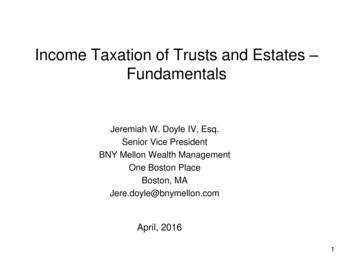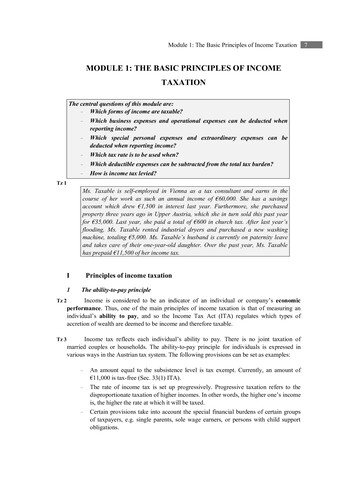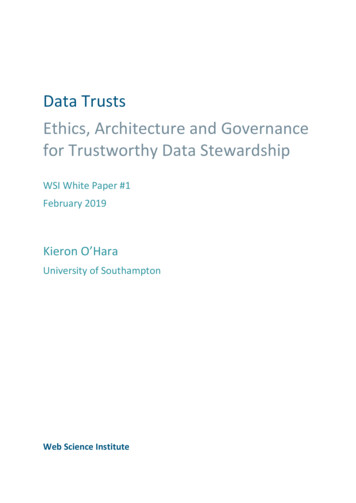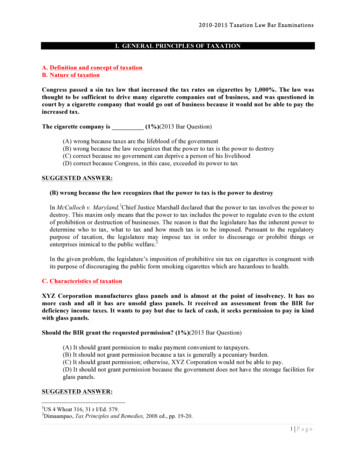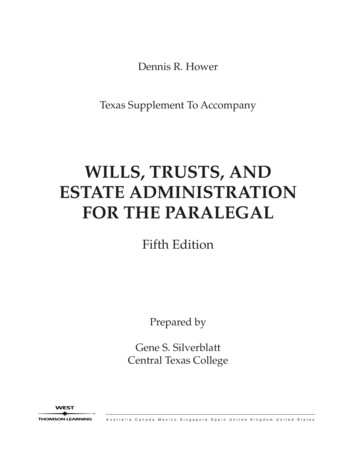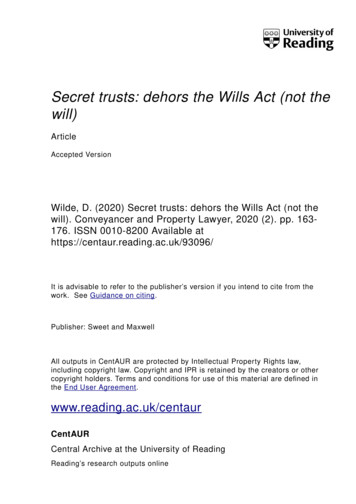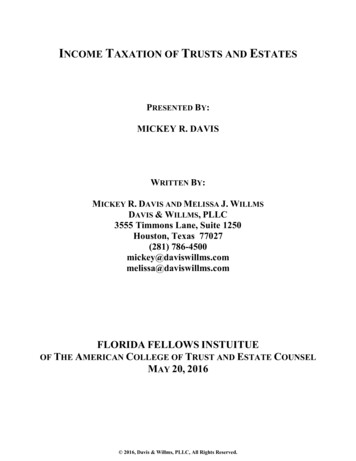
Transcription
INCOME TAXATION OF TRUSTS AND ESTATESPRESENTED BY:MICKEY R. DAVISWRITTEN BY:MICKEY R. DAVIS AND MELISSA J. WILLMSDAVIS & WILLMS, PLLC3555 Timmons Lane, Suite 1250Houston, Texas 77027(281) comFLORIDA FELLOWS INSTUITUEOF THE AMERICAN COLLEGE OF TRUST AND ESTATE COUNSELMAY 20, 2016 2016, Davis & Willms, PLLC, All Rights Reserved.
MICKEY R. DAVISDavis & Willms, PLLCBoard Certified - Estate Planning and Probate LawTexas Board of Legal Specialization3555 Timmons Lane, Suite 1250Houston, Texas 77027Phone (281) 786-4500Fax (281) 742-2600mickey@daviswillms.comEDUCATION:· University of Texas School of Law, J.D. with High Honors, 1982. Chancellors; Order of the Coif; Associate Editor, TEXAS LAWREVIEW; Member, Board of Advocates· University of Arizona, B.B.A. with High Distinction, 1979. Beta Alpha Psi; Beta Gamma SigmaOTHER QUALIFICATIONS:· Fellow, The American College of Trust and Estate Counsel (ACTEC), (Member: Business Planning, Estate & Gift Tax, andFiduciary Income Tax Committees; Chair: Estate & Gift Tax Committee, 2013-1016)· Board Certified, Estate Planning and Probate Law, Texas Board of Legal Specialization· Adjunct Professor, University of Houston School of Law, 1988–present, teaching Income Taxation of Trusts and Estates andPostmortem Estate Planning· Best Lawyers in America, Trusts and Estates· Named Best Lawyers' 2013 Houston Trusts and Estates "Lawyer of the Year"· Named by Texas Lawyer as a 2013 "Top Notch Lawyer" for Trusts and Estates· Admitted to Practice: State Bar of Texas; Federal District Court for the Southern District of Texas; United States Tax Court· Certified Public Accountant, Texas, Certified 1983PROFESSIONAL ACTIVITIES:· Member of the Board of Directors, ACTEC Foundation (Chair: Grants Committee)· Editor, ACTEC Law Journal (2012-2013)· Member, State Bar of Texas (Sections of Real Estate, Probate and Trust Law; Tax); Houston Bar Association (Probate, Trusts andEstates Section); The College of the State Bar of Texas; Houston Estate and Financial Forum· Member, Texas Society of Certified Public Accountants, Houston Chapter· Estate Planning and Probate Law Exam Commission, Texas Board of Legal Specialization (Member 1993-2003, Chair 2000-2003)RECENT SPEECHES AND PUBLICATIONS:· Co-Author: Streng & Davis, RETIREMENT PLANNING–TAX AND FINANCIAL STRATEGIES (2nd ed., Warren, Gorham & Lamont 2001,updated annually)· Panelist: Ground Control to Major Tom: Clients Giving Up Control, Retaining Control, and Avoiding Being ImproperlyControlled, State Bar of Texas 22nd Annual Advanced Estate Planning Strategies Course, 2016· Co-Author/Panelist: Planning for Married Clients: Charting a Path with Portability and the Marital Deduction, PlanningTechniques for Large Estates Annual Advanced ALI CLE Course, 2016· Co-Author/Panelist: All About that Basis: How Income Taxes Have Reshaped Estate Planning, Planning Techniques for LargeEstates Annual Advanced ALI CLE Course, 2016· Author/Speaker: If I Obergefell in Love with You: Same-Sex Marriage and its Impact on Estate Planning in Texas; HoustonBusiness and Estate Planning Council, 2016· Co-Chair/Panelist: The University of Texas School of Law 63rd Annual Tax Conference – Estate Planning Workshop, 2015· Author/Speaker: All About that Basis: Creative Ways to Obtain Basis at Death, National Association of Estate Planning Councils,52nd Annual NAEPC Advanced Estate Planning Strategies Conference, 2015· Co-Author/Panelist: Tax Issues in Fiduciary Litigation, Federal Tax Institute of New England, 2015· Author/Speaker: Fiduciary Income Taxation and Subchapter J, American Bar Association Section of Real Property, Trust & EstateLaw, Skills Training for Estate Planners – Fundamentals Course, 2015· Co-Author/Panelist: Irrevocable and Non-amendable: Post Death Modifications, Reformations and Restructuring, AddressingLitigation and Tax Components, State Bar of Texas 21st Annual Advanced Estate Planning Strategies Course, 2015· Co-Author/Panelist: Tax Aspects of Estate and Trust Litigation, ACTEC 2015 Annual Meeting· Author/Speaker: Planning for Basis at Death, ABA Midyear Meeting—Fiduciary Income Tax Committee Meeting, 2015; TheUniversity of Texas School of Law 62nd Annual Tax Conference – Estate Planning Workshop, 2014.· Co-Author/Panelist: Evaluating Portability, Potential Problems and the Post-ATRA Planning Paradigm, 40th Annual Notre DameTax and Estate Planning Institute, 2014· Co-Author/Panelist: Directed Trusts and the Slicing and Dicing of the Trustee's Duties, ACTEC 2014 Fall Meeting· Author/Speaker: Basis Adjustment Planning, State Bar of Texas 38th Annual Advanced Estate Planning and Probate Course, 2014;Houston Bar Association Probate Section, 2014· Co-Author/Panelist: Recipes for Income and Estate Planning in 2014, State Bar of Texas 20th Annual Advanced Estate PlanningStrategies Course, 2014· Co-Author/Speaker: Income Taxation of Trusts and Estates—Ten Things Estate Planners Need to Know, Southern Arizona EstatePlanning Council, 2014
MELISSA J. WILLMSDavis & Willms, PLLCBoard Certified - Estate Planning and Probate LawTexas Board of Legal SpecializationMaster of Laws (LL.M.) in Tax Law3555 Timmons Lane, Suite 1250Houston, Texas 77027Phone (281) 786-4500Fax (281) 742-2600melissa@daviswillms.comEDUCATION:· LL.M., Tax Law, University of Houston Law Center, 1996· J.D., Texas Tech University School of Law, 1992· B.A., Psychology, B.A., Sociology, University of Texas at Austin, 1987OTHER QUALIFICATIONS:· Fellow, The American College of Trust and Estate Counsel (ACTEC) (Member, Estate & Gift Tax Committee)· Board Certified, Estate Planning and Probate Law, Texas Board of Legal Specialization· Best Lawyers in America, Trusts and Estates· Admitted to Practice: State Bar of Texas; Federal District Court for the Southern District of Texas; United States Tax CourtPROFESSIONAL ACTIVITIES:· Real Estate, Probate and Trust Law Section, State Bar of Texas (Council Member, 2014-2018; Member, Decedents’ EstatesCommittee, 2011-present; Chair, Decedents’ Estates Committee, 2015-2017)· Tax Section, State Bar of Texas (Council Member, 2013-2016; Vice Chair, Estate and Gift Tax Committee, 2011-2014)· Fellow, Texas Bar Foundation· Member, State Bar of Texas (Sections of Real Estate, Probate and Trust Law; Tax); Houston Bar Association (Section of Probate,Trusts and Estates); The College of the State Bar of Texas; Houston Estate and Financial ForumRECENT SPEECHES AND PUBLICATIONS:· Co-Author/Panelist: Planning for Married Clients: Charting a Path with Portability and the Marital Deduction, PlanningTechniques for Large Estates Annual Advanced ALI CLE Course, 2016· Co-Author/Panelist: All About that Basis: How Income Taxes Have Reshaped Estate Planning, Planning Techniques for LargeEstates Annual Advanced ALI CLE Course, 2016· Co-Author/Speaker: Income Taxation of Trusts and Estates, The Center for American and International Law 52nd Annual ShortCourse on Estate Planning, 2016· Co-Author/Panelist: When 25 Million Is Middle Class, How Should We Plan and Draft for the Middle Class Married Couple?,50th Annual Heckerling Institute on Estate Planning, 2016· Panelist: Asset Protection Trusts in Texas? Really?, The University of Texas School of Law 63rd Annual Tax Conference – EstatePlanning Workshop, 2015· Co-Author/Panelist: Tax Issues in Fiduciary Litigation, Federal Tax Institute of New England, 2015· Author/Speaker: Income Tax Basics for Estate Planners, American Bar Association Section of Real Property, Trust & Estate Law,Skills Training for Estate Planners – Fundamentals Course, 2015· Co-Author/Panelist: Treating Capitals Gains as Trust Accounting Income: Essential Updates for Estate Planners, ACTEC-ALICLE Telephone Seminar/Audio Webcast, 2015· Author/Speaker: Decanting Trusts: Irrevocable, Not Unchangeable, Corpus Christi Estate Planning Council, 2015· Author/Speaker: Between Death and Probate: Selected End-of-Life Issues, Disability and Elder Lawyers Association, 2015; EastTexas Estate Planning Council, 2015; The University of Texas School of Law 16th Annual Estate Planning, Guardianship and ElderLaw Conference, 2014· Panelist: Planning with SCINs and Private Annuities – Seizing Opportunities While Navigating Complications, 49th AnnualHeckerling Institute on Estate Planning, 2015· Co-Author/Panelist: Evaluating Portability, Potential Problems and the Post-ATRA Planning Paradigm, 40th Annual Notre DameTax and Estate Planning Institute, 2014· Co-Author/Panelist: Directed Trusts and the Slicing and Dicing of the Trustee’s Duties, ACTEC 2014 Fall Meeting· Panelist: The Changing Role of the Fiduciary and Who Represents Them, State Bar of Texas 38th Annual Advanced Estate Planningand Probate Course, 2014· Co-Author/Panelist: It Slices, It Dices, It Makes Julienne Fries: Cutting-Edge Trust Tools, State Bar of Texas 20th AnnualAdvanced Estate Planning Strategies Course, 2014· Author/Speaker: End-of-Life Issues, State Bar of Texas Advanced Elder Law Course, 2014· Co-Author/Speaker: The Brave New World of Estate Planning, San Antonio Estate Planners Council's Docket Call in ProbateCourt, 2014· Comment letter to Department of Treasury on behalf of the Tax Section of the State Bar of Texas on proposed regulations regardingreporting of net investment income tax by trustees of charitable remainder trusts, February 20, 2014· Author: Decanting Trusts: Irrevocable, Not Unchangeable, 6 EST. PLAN. & COMMUNITY PROP. L.J. 35, 2013
INCOME TAXATION OF TRUSTS AND ESTATESI. INTRODUCTION . 1II. TYPES OF TAXPAYERS. 1A. General Rules . 1B. Taxable Income . 2C. Capital Gains . 2D. Tax on Net Investment Income . 2III. INCOME TAX CONSEQUENCES OF GIFTS AND LOANS . 2A. Income Tax Consequences of Gifts to the Donor. . 21. Post-Gift Income . 22. Unrealized Gain . 33. Below-Market Loans. . 34. Gain from "Net Gift" Transactions. 35. Gain from Assumption of Non-Recourse Debt . 36. Gift of Installment Obligation . 37. Gift of Passive Loss Assets . 3B. Income Tax Consequences of Gifts to the Donee. . 31. No Income Tax on Gifts or Bequests . 32. Taxation of Post-Gift Income. . 33. Taxation of Post-Death Income . 34. Taxation of Forgiveness Of Indebtedness . 3C. Loans to Family Members. . 31. Below-Market Loan Rules . 32. Loans Under 10,000. . 33. Loans Under 100,000. . 44. Investment Income Limitation . 45. Loans at "Applicable Federal Rate" of Interest . 4IV. INCOME TAX CONSEQUENCES OF RELATED PARTY TRANSACTIONS . 4A. Who Is a Related Party? . 4B. Section 1031 Exchanges Between Related Parties . 4C. Sales of Depreciable Assets to Related Party . 4D. Sale of Depletable Property to Related Party . 4E. Appreciated Property Acquired by Decedent by Gift Within One Year of Death. . 5F. Disallowance of Losses on Sales Between Related Parties . 5G. Guarantee of Loans to Related Parties . 5H. Installment Sale to Related Party . 5I. Non-Recognition of Gain or Loss Between Spouses . 5J. Transfer for Value of Life Insurance . 5V. PRE-DEATH INCOME TAX PLANNING . 5A. Capture Capital Losses . 5B. Transfer Low Basis Assets to the Taxpaye . 61. Gifts Received Prior to Death . 62. Granting a General Power . 6C. Transfer High Basis Assets to Grantor Trust . 6D. Change Marital Property Characteristics. 61. Partition Depreciated Community Property . 72. Transmute Appreciated Separate Property. . 7E. Dispose of Passive Loss Assets. . 7F. Pay Medical Expenses. 7i
G. Accelerate Death Benefits . 71. Payments to Terminally Ill Taxpayers. . 82. Payments to Chronically Ill Taxpayers. . 8VI. INCOME TAXATION OF DECEDENTS . 8A. The Decedent's Prior Tax Returns . 81. Ascertaining What Tax Returns Have Been Filed . 82. Ascertaining the Amount of the Decedent's Income . 83. Getting Copies of Prior Filed Tax Returns . 84. Contact Area Disclosure Office . 8B. The Decedent's Final Return. . 81. Due Date, Filing Responsibilities, and "Short Year" Issues . 92. "Fiduciary Liability". . 93. Transferee Liability. . 104. Priority of Tax Claims. . 105. Claims for Refund. . 116. Place for Filing Decedent's Final Return . 117. Applicable Statute of Limitations. 118. Filing Joint Returns . 119. Planning Opportunities on the Final Return . 12VII. WHAT IS BASIS? . 13A. Basis in Property Acquired from a Decedent. . 13B. Holding Period. . 14C. What Property is "Acquired from a Decedent"? . 151. Inherited Property. . 152. Revocable Trust Property. . 153. Property with Retained Right to Control Beneficial Enjoyment . 154. Property Subject to a General Power of Appointment. . 165. Both Halves of Community Property . 166. Other Property Includable in the Decedent's Gross Estate . 167. QTIP Property . 16D. Exceptions. . 161. Assets Representing Income in Respect of a Decedent . 162. Property Inherited Within One Year of Gift . 163. Depreciable Property Owned by Others. . 164. Property Subject to a Conservation Easement . 17E. Persons Dying in 2010. . 17F. Contrast Basis in Property Acquired by Gift. . 171. Donee's Basis to Determine Gain . 172. Donee's Basis to Determine Loss . 173. Basis for Gift Tax Paid . 174. Basis for GST Tax Paid . 185. Basis of Suspended Passive Losses . 18VIII. INCOME TAXATION OF TRUSTS AND ESTATES . 18A. General Rules . 18B. The Estate's Income Tax Return. . 181. Obtaining an Employer Identification Number. . 182. Notifying the IRS of Fiduciary Status . 193. Post-Death Revocable Trusts May Be Separate Taxpayers or Part of the Estate . 194. Passive Activity Losses . 225. Allocating Depreciation . 23ii
C. State vs. Federal Law Notions of "Income". . 231. When An Estate or Trust Allocates "Income," That Means FiduciaryAccounting Income, Not Taxable Income. . 23D. The Conduit Principle of Taxation. . 27E. Ten Things that Estate Planners Need to Know About Subchapter J . 271. Trusts Can Be Simple or Complex (and Estates are Taxed Like Complex Trusts) . 282. Estate and Trust Distributions Carry Out Distributable Net Income . 293. Trusts and Estates Get Unlimited Income Tax Deductions for CharitableDistributions. . 324. Interest Paid on Pecuniary Bequests May Be Deductible . 325. Net Losses and Excess Deductions of Trusts and Estates are Wasted,Except in Their Final Year . 336. An Estate May Recognize Gains and Losses When it Makes Distributionsin Kind . 347. Estate Beneficiaries May Recognize Gains and Losses if the Estate MakesUnauthorized Non Pro Rata Distributions in Kind . 368. Income in Respect of a Decedent is Taxed to the Recipient . 379. The Executor Can Elect to Deduct Many Expenses for Either Income orEstate Tax Purposes (but not Both) . 3810. Understanding the Grantor Trust Rules. 40VIII. STATE INCOME TAXATION OF TRUSTS . 43A. Constitutional Issues. . 441. The Nexus Requirement. . 442. Contacts Supporting State Taxation . 443. Broader Views of Contacts. 444. Interstate Commerce Issues . 44B. State Tax Regimes. . 451. Resident vs. Non-Resident Trusts . 452. Determining Trust Residency. . 453. Income Derived from Within the State . 45X. ADDITIONAL INCOME TAX ON ESTATES AND TRUSTS . 46A. Health Care and Education Reconciliation Act of 2010, P.L. 111-152 . 46B. IRC § 1411. . 46C. Regulations. . 461. Proposed Regulations . 462. Final Regulations. . 47D. Net Investment Income vs. Undistributed Net Investment Income . 47E. Trade or Business . 48F. Trusts. . 48G. Grantor Trusts . 48H. Special Problem Areas. . 481. Capital Gains . 482. Passive Activities, Passive Income, and the Passive Loss Rules . 493. Qualified Subchapter S Trusts ("QSSTs") . 514. Electing Small Business Trusts ("ESBTs") . 525. Charitable Remainder Trusts . 526. Allowable Losses and Properly Allocable Deductions . 53I. Special Notes. 531. Tax Does Not Apply to Distributions from Qualified Plans . 53iii
2. Nonresident Aliens . 53J. Planning for the Tax . 53XI. CONCLUSION . 54EXHIBIT A: Basis Rules for Persons Dying in 2010. 55EXHIBIT B: IRC 1411Net Investment Income (Preliminary) . 57iv
INCOME TAXATION OF TRUSTS AND ESTATES1INCOME TAXATION OF TRUSTS AND ESTATES1I. INTRODUCTIONIncome taxes are a pervasive part of our lives. With the passing of the American Taxpayer Relief Act of2012 ("ATRA 2012") by Congress on January 2, 2013 and ATRA 2012 becoming law on January 4, 2013,estate planners and their clients have seen a new focus on the role of income taxes as part of estate planning.ATRA 2012 reunified and made "permanent" the estate, gift, and generation-skipping transfer ("GST") taxlaws. As part of these new laws, the highest tax bracket for estate, gift, and GST tax purposes went from35% to 40%, making the spread between these tax rates and the highest income tax rate virtually nil.Combining the large (and inflation-adjusted) estate tax exemptions, together with portability, higher incometax rates, and a new income tax, estate planners have to change the conversations that we have with clientsduring the estate planning and the estate administration process.As a result, it is essential for estate planners to have a fundamental understanding of the income tax issuesthat are important to their clients. These issues relate not only to income taxation of individuals, but alsoincome taxation of trusts and estates. The income tax arena presents a multitude of planning opportunitiesthat arise, both during lifetime, and during the administration of a trust or a decedent's estate. Steps taken(or not taken) by the fiduciary in the course of administering a trust or estate can have important incometax implications. This paper is intended as a resource to highlight essential income tax planning issues thatarise (i) when drafting wills and trust agreements; and (iii) when administering a trust or the estate of adecedent. It assumes that the reader has a passing familiarity with non-tax issues associated with theadministration of trusts and estates. While not a complete treatise on the subject, the paper is intended tohighlight areas of income tax planning and reporting for grantors, executors, trustees, and beneficiaries.II. TYPES OF TAXPAYERSA. General Rules. Estate planning attorneys will tell you that trusts and estates are not "juridical" entities,by which they mean that unlike individuals, partnerships, corporations, and the like, they do not exist apartfrom the fiduciaries that control them. You cannot sue a trust or an estate, nor can a trust or an estatetechnically own property, earn income, or pay tax. Rather, the executor or trustee is the proper party tolitigation. The executor or trustee holds legal title to assets, but in short, trusts and estates are not technicallylegal entities. Nevertheless, for purposes of applying the income tax rules, Congress and the IRS generallytreat trusts and estates themselves as though they were entities. In this paper, we follow the same approach.When computing the taxable income of a trust or estate, then, we treat it as though it were a legal entity,and speak of the income, expenses, deductions and cr
INCOME TAXATION OF TRUSTS AND ESTATES PRESENTED BY: MICKEY R. DAVIS WRITTEN BY: MICKEY R. DAVIS AND MELISSA J. WILLMS DAVIS & WILLMS, PLLC 3555 Timmons Lane, Suite 1250 Houston, Texas 77027 (281) 786-4500 mickey@daviswillms.com melissa@daviswillms.com FLORIDA FELLOWS INSTUITUE
